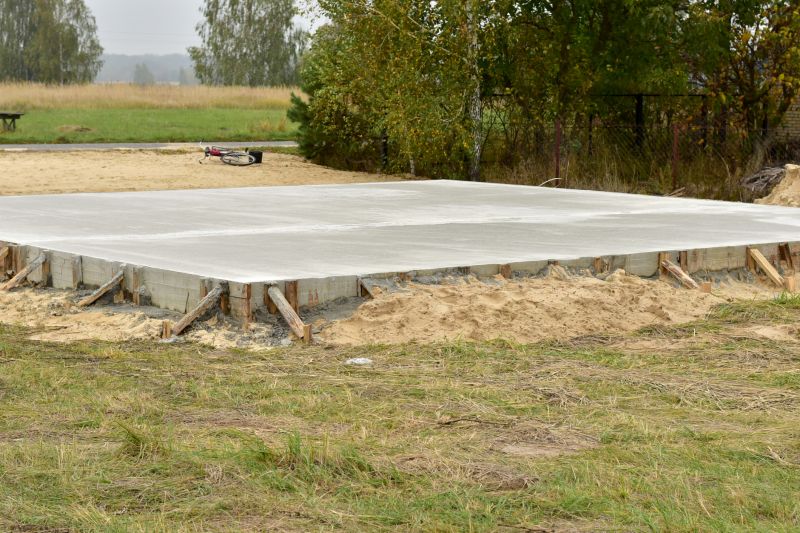Popular Solutions For Concrete Installation To Boost Productivity
Discover tools and materials that streamline your concrete projects, saving time while maintaining high standards.
 Concrete installation projects in Bloomington, IN, require a diverse range of products to ensure durability, safety, and aesthetic appeal. From foundational work to decorative finishes, selecting the appropriate tools and materials is essential for successful outcomes. Proper preparation and the right product choices can significantly influence the longevity and appearance of concrete structures. Whether undertaking a small residential repair or a large commercial project, understanding the available options helps in making informed decisions.
Concrete installation projects in Bloomington, IN, require a diverse range of products to ensure durability, safety, and aesthetic appeal. From foundational work to decorative finishes, selecting the appropriate tools and materials is essential for successful outcomes. Proper preparation and the right product choices can significantly influence the longevity and appearance of concrete structures. Whether undertaking a small residential repair or a large commercial project, understanding the available options helps in making informed decisions.
Top Overall Option
Concrete Bonding and Sealing Compound
A high-quality bonding and sealing compound serves as a versatile product suitable for multiple stages of concrete installation. It enhances adhesion between old and new concrete surfaces, improves surface durability, and provides a protective barrier against moisture and chemicals. This product is widely applicable for repair, renovation, and new construction projects, making it an essential component in any concrete toolkit.
Types of Products For Concrete Installations
Concrete Mixes
Pre-mixed or custom-blended concrete mixes tailored for various load requirements and finishes.
Bonding Agents
Products that improve adhesion between existing concrete and new overlays or repairs.
Concrete Sealers
Protective coatings that seal the surface against moisture, stains, and wear.
Form Release Agents
Materials applied to molds to ensure smooth removal and prevent concrete from sticking.
Reinforcement Materials
Steel rebar, wire mesh, or fiber reinforcements to enhance structural integrity.
Expansion Joints
Flexible joints to accommodate concrete expansion and contraction, preventing cracking.
Concrete Vibrators
Tools used to eliminate air pockets and ensure proper compaction during pouring.
Finishing Tools
Floats, trowels, and edgers for achieving desired surface smoothness and texture.
Curing Compounds
Products that retain moisture and promote proper curing for optimal strength development.
Surface Texturing Materials
Tools and agents to create slip-resistant or decorative finishes.
Concrete Edging Tools
Specialized tools for creating clean, defined edges around slabs and walkways.
Patching and Repair Mortars
Materials designed to fill cracks, holes, and surface imperfections.
Concrete Dyes and Colorants
Additives to introduce color and decorative effects into concrete surfaces.
Formwork Materials
Plywood, metal, or plastic forms used to shape concrete during setting.
Concrete Demolding Agents
Products that facilitate easy removal of forms once concrete has set.
Popular Choices
Adhesives designed to bond concrete surfaces for repairs and overlays.
Additives that improve concrete flexibility, adhesion, and durability.
Barrier layers to prevent water ingress in below-grade or exposed concrete.
Synthetic or steel fibers added to concrete mixes for crack resistance.
Surface treatments that increase traction on concrete walkways and ramps.
Saws and blades designed for precise cutting and shaping of hardened concrete.
Power washers and cleaning agents to prepare concrete surfaces before application.
Products that facilitate the removal of forms without damaging the concrete surface.
Tools used to remove surface imperfections or create textured finishes.
Preformed or poured materials to fill and seal expansion joints.
Compact and consolidate concrete during placement for uniform density.
Chemical stains that produce variegated color effects on concrete surfaces.
Resilient coatings for floors and surfaces requiring chemical resistance.
Self-leveling overlays to create smooth, flat surfaces.
Pre-mixed compounds for quick and effective surface repairs.
Bracing and support systems to hold forms securely during pouring.
Concrete installation involves multiple steps, including surface preparation, mixing, pouring, finishing, and curing. Each phase benefits from specialized products designed to optimize results. For example, primers and bonding agents enhance adhesion, while sealers protect against moisture and wear. Accessories like expansion joints and reinforcement materials provide structural integrity. The variety of products available caters to different project sizes, complexities, and specific requirements.
In Bloomington, IN, local suppliers and hardware stores offer a broad selection of these products, ensuring accessibility for contractors and DIY enthusiasts alike. Quality and compatibility are key considerations, as the right products can improve work efficiency and outcome quality. Additionally, safety equipment and proper handling procedures should not be overlooked to maintain a secure working environment. Overall, investing in the right concrete installation products can facilitate smoother workflows and more durable results.
Key Buying Considerations
- Determine the specific application and required product type for your project.
- Check compatibility of products with existing surfaces or materials.
- Consider the environmental conditions, such as exposure to moisture or chemicals.
- Evaluate the curing and drying times to fit your project timeline.
- Assess the ease of application and required tools or equipment.
- Review the durability and intended lifespan of the product.
- Ensure safety features and proper handling instructions are available.
- Compare product formulations for flexibility, adhesion, and strength enhancement.
- Look for products that offer consistent performance and quality standards.
- Consider the size and quantity needed to avoid multiple purchases or waste.
- Verify if the product is suitable for both indoor and outdoor use.
- Check for any special storage requirements or shelf life limitations.
- Read customer reviews and ratings for insights into real-world performance.
- Consult local suppliers for availability and compatibility with regional conditions.
- Budget considerations should align with project scope without compromising quality.
This content contains affiliate links. We may earn a commission if you make a purchase through these links, at no additional cost to you.
